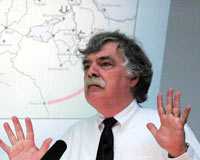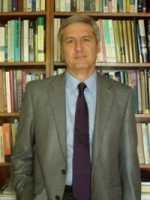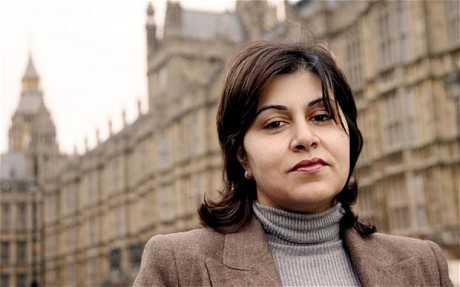Betula Nelson
hhtp://ataturksocietyuk.com
10/02/2001
LSE conference speaker Professor J McCarthy attacked by Armenian audience
Organised by the Federation of Turkish Associations UK and entitled ‘Turkish- Armenian Relations’ this conference took place at the London School of Economics on Friday the 4th February 2011. It was attended by approximately 350 people and amongst the guests were Dr Andrew Mango, British Armenian historian Ara Sarafians,Turkish Ambassador, Azerbaijani Ambassador and other embassy officials. This annual conference is held in remembrance of the Turkish diplomats who were the victims of Armenian terrorists in several countries in the past.
The guest speaker Prof. Justin McCarthy specialises in the social and demographic history of the Modern Middle East, particularly Turkey and the Ottoman Empire. He is presently Distinguished Professor of Arts and Sciences and Distinguished University Scholar at the University of Louisville.He spoke on the subject of ‘Prejudice, Deception and the Armenian Question’.
The conference was chaired by Prof. Sevket Pamuk, Turkish Studies Dept. at the LSE.
Prof. McCarthy explained that the 1915-1919 War years have already been widely discussed and written about, therefore he would concentrate on an earlier period around the 1890s and particularly the Sasun events. He demonstrated with maps, photographs and cartoons how it would have been impossible to report the events from Sasun as they had been by British Embassy Consulars and the various American missionaries who never got beyond the cities of Van or Kayseri. Due to the remoteness of the area, all the reports were second hand and Armenian based. The reports of the Association Press, British Daily News and weekly news in USA cannot be accepted as reliable because they were all based on reports by the Anglo-Armenian Association and missionary reports emanating from Boston. Sometimes these reports were made up as the reporters never managed to go to the claimed massacre sites and had nothing to report other than what they had heard.
Professor McCarthy also talked about the Hacin reports and demonstrated with photographs that the stories about Turks burning down a whole town were untrue because the houses were not made of wood and were upright in a photo taken after the reported event. These serious falsehoods were confirmed by the 1st established Commission by the British, French and Russians and this showed that a/those first killed were the Kurds and b/the Armenian dead was not in the thousands – it was 264. The Professor claimed that most of the reports were fabrications because the Ottoman government gave no figures and the reports were filed from Istanbul sometimes by ignorant AP agents who thought that the city of Kayseri was in Syria! Therefore these reports cannot be relied upon.
The significant theme of the conference was the prejudice which seemed to have been behind the deception and the myths that were created about the Ottoman Turks and events relating to Armenians. The ignorance of the Americans and others were clearly demonstrated in the media portrayal of the Ottoman Turks; they were drawn looking like monkeys and a mixture of Africans and Orientals. They were also portrayed as barbarians, rejoicing in the killings of children and babies in some of the cartoons. The Professor argued that the reports sent to US via British sources and based on claims by Armenian separatists organisations were clearly biased and were determined to influence the world view by portraying the Ottoman Turks in the most negative and horrible way possible. Professor McCarthy’s view was that it would be both wrong and foolish to accept the Armenian claims about massacres based on hearsay and made up stories.
Professor McCarthy explained the context of these events and reminded the audience that Ottoman empire was multiculturalistic and that there was a big movement towards ‘nationalism’ at the time. Unlike the Bulgarians and the Greeks, Armenians did not make up the largest populations in the areas they inhabited (around 20%) and therefore they were not entitled to a state of their own. This the Professor argued was behind the falsifications and myths which the Armenian activists created with the help of the British. For them the war was another means to obtaining a national state on the Ottoman lands.
Verbal attacks from Armenian activists
Unfortunately this was very embarrassing and less than civilised as some of the Armenians verbally attacked the speaker and called him names such as ‘the devil’, ‘liar’ and claimed that he had ‘sold out to the Turkish government’ during the question an answer period. It appeared that they were particularly annoyed because he did not talk about the 1915-1919 period, though the reasons for this were explained at the beginning of his speech. Although the chair gave everyone the opportunity to ask questions, some Armenian fanatics abused the rules and instead of asking questions they resorted to insults and ranting. There were a number of good and sensible questions, however the civilised atmosphere of the conference was spoiled by the behaviour of a minority group.
I felt that Professor McCarthy was heroic in the way he withstood the attacks and the insults, and responded with facts which after all what matters most in this debate. His statement – ‘only the ones without a real argument resort to insults’ seemed to sum up the behaviour of the few pretty well.
Betula Nelson
Media Coordinator
The Ataturk Society of the UK







